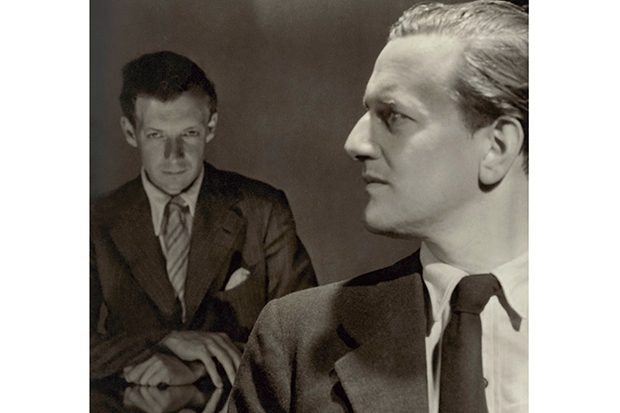‘You are the most adorable man and artist, intelligent, gifted, simple, loving and noble… I am really very, very lucky to be alive with you around….’ The relationship between the tenor Peter Pears and the composer Benjamin Britten is part of our cultural and national furniture. A partnership spanning nearly 40 years drove each artist to the peak of his creative and expressive powers, producing works like Peter Grimes, Winter Words and the War Requiem, as well as their definitive recordings. But music is only half of the Britten-Pears story.
Before his death in 1976, Britten asked his friend and publisher Donald Mitchell to ‘tell the truth about Peter and me’. Both he and Pears were keen to turn a relationship lived behind closed doors — an open secret, but a secret nonetheless — into something real and admissible. The publication of their entire correspondence, 365 letters written from their earliest encounters through to the final year of Britten’s life, is something both passionately wanted.
Published here in full for the first time, these letters bear witness to a relationship in which love and creativity and romantic and professional lives are so tightly entwined that to try and separate them would make a nonsense of both. To read them is, as Fiona Shaw observes in her foreword, ‘to climb up a wall and peer into the secret garden of two giants’, an experience at once voyeuristic and involving.
‘I don’t think you ever realise how much you help me… you give me a loving critical confidence in every way.’ Composer and performer, artist and muse, lover and lover — the many strands of the Britten-Pears relationship all meet in Britten’s own music. Biographies have tended to stress the creative genius of Britten, reducing Pears to a supporting role; but what emerges here is a portrait of absolute creative co-dependence.
Roles like Grimes, Captain Vere, Essex and Peter Quint were not just created by Pears, they were created for him. ‘Frankly,’ writes Britten in 1965, ‘I find other singers rather non-inspiring to write for.’ The classic perception of Britten as an instinctive composer (as opposed to a grafter like William Walton) to whom music came easily is also substantially challenged, as we see the struggles and subsequent reassurance from Pears that yielded not only early works like Grimes (‘My bloody opera stinks and that’s all there is to it’) but even Lucretia and Gloriana.
Britten’s admiration for Pears’s talent is stressed again and again. He is ‘potentially the greatest singer alive’, ‘the greatest artist that ever was’. Britten finds it ‘wonderful to be born’ in the tenor’s lifetime, and confesses that ‘something goes wrong with my life’ when the singer’s ‘golden box’ of a voice isn’t working. But the joy and awe is more than reciprocated. In one of the most touching exchanges of the correspondence, towards the end of the composer’s life, Pears tells Britten, ‘It is you who have given me everything… I am here as your mouthpiece and I live in your music.’
It quickly becomes clear that the two musician-lovers existed in a world that was all but hermetically sealed against outside intrusion, a ‘sharing of personalities’. Friends and colleagues come and go, many passing through their lives rather than remaining a constant, and Britten speaks often of dropping, or breaking up with, individuals. There’s a cool appraisal, a coldness even, when talking of others that bears little resemblance to the effusive warmth between the lovers.
The letters offer a series of cameo portraits of these friends and colleagues (both musicians and beyond), that are deliciously succinct. The great German tenor Dietrich Fischer-Dieskau is ‘musical, but grand’, the conductor Karl Richter ‘really rather nice…and musical (in the German way)’, while a young David Hockney is ‘a very direct, open, unspoilt person’ and Stephen Spender is a ‘bright spot’ in an otherwise ‘putrid’ evening, and ‘surprisingly sympathetic’.
Editorial introductions to each chronological batch of letters help anchor these private lives in a public context, offering essential political and social geography. The question of Britten and Pears’s homosexuality — the friction between their public roles as much decorated national treasures and the unspoken, illegal reality of their private lives (‘We are after all queer and left and conshies which is enough to put us, or make us put ourselves, beyond the pale’) — is carefully teased out. These are men who may have avoided the indignity and intrusion of arrest suffered by Gielgud, but whose professional success balanced precariously on an omission that came very close to a lie.
The letters are revealed as the true emotional fabric of a relationship too fragile to be exposed to the ear of an operator, too passionate to be confined within the limits of a three-minute international call. They speak of love and longing, of separation and frustration, but above all they speak of music: not just the soundtrack to a relationship, but a relationship in itself. These letters are the true libretto to Britten’s operas — texts that could not be spoken, but that are sung in every note he ever wrote for Pears, his ‘beloved man’.






Comments